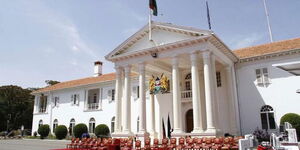President William Ruto on Tuesday announced the government's intention to impose more taxes on Kenyans to help the country get out of debt distress.
The Head of State made the pronouncement during a meeting with Harvard University students at the State House in Nairobi where he affirmed his commitment to ensuring that Kenya charts a path towards sustainability and avoids taking out loans.
Ruto stated that the only way to do this is for every eligible Kenyan to pay their fair share to the taxman.
To that end, Ruto revealed the government's plan to increase taxation from 14 per cent to 16 per cent by the end of 2024 and 22 per cent by the end of his first term.
“I am not going to preside over a bankrupt country, I am not going to preside over a country that is in debt distress. We have to cut our spending," Ruto declared.
The Head of State while defending his move, argued that Kenya's tax rates were way below the threshold by the country's peers across the continent.
“Kenyans have been socialised to believe they pay a lot of taxes, but empirical data shows that Kenya last year our tax was at 14 per cent," Ruto stated.
"Our peers in the continent are between an average of between 22 per cent and 25 per cent, our taxes are way below our peers," he argued.
Ruto's sentiments came barely a week after the National Treasury gazetted the Finance Bill, 2024 which proposed a slew of new taxes which attracted backlash from finance experts and Kenyans in general.
Among the proposed taxation included, a motor vehicle tax set at 2.5 per cent of the vehicle's value pegged at a minimum of Ksh5,000 and a maximum of Ksh100,000. This will be enforced by insurance companies with Kenyans expected to make the payments at the point of taking out insurance policies.
The Bill also proposed a minimum top-up tax for multinationals with a gross (consolidated) turnover of Ksh106 billion.
Besides these two, the Bill also proposed a revision of the VAT charged on bread up to 16%. However, President William Ruto later directed the Treasury to shelve this proposed change to cushion Kenyans from a high cost of living.
Had this been implemented, the price of bread would have increased by Ksh10.












